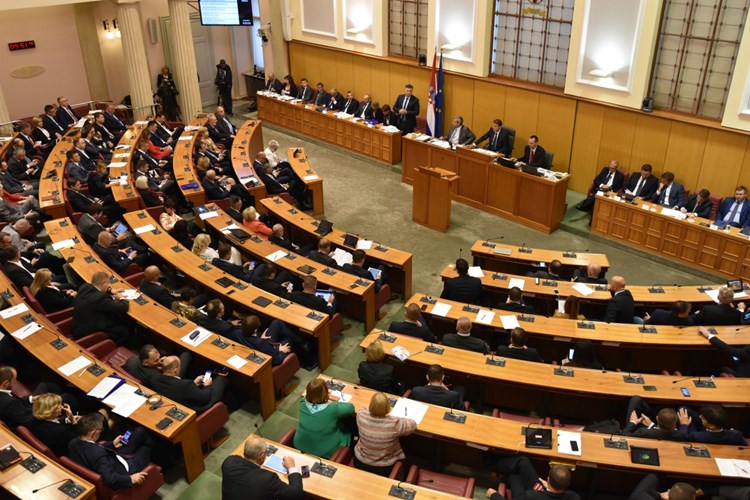The Relationship between the Government and Parliament
The Croatian Parliament is the representative body of citizens and the holder of legislative power, whilst the Government is the holder of executive power in the Republic of Croatia. Both institutions have their seats on St Mark’s Square in Zagreb's Upper Town.
After the Government has been given a vote of confidence by a majority of Members of Parliament, and when the Prime Minister and the members of the Government have been sworn in before Parliament, the Government becomes responsible to the Parliament, which supervises the work of the Government. After the swearing in ceremony, the Speaker of Parliament co-signs with the President of the Republic a Decision to appoint the Prime Minister, and, with the Prime Minister, the appointment of members of the Government. The Prime Minister also submits his resignation to Parliament, and he must inform Parliament of his acceptance of the resignations of individual members of the Government.
Members of Parliament have the right to ask the Government and individual ministers verbal or written questions. At least one tenth of Members of Parliament may file for interpellation on the work of the Government or its individual members, and at least one fifth of Members of Parliament may raise the question of confidence in the Prime Minister, an individual member, or the Government as a whole.

The Government is obliged, at the request of Parliament or on its own initiative, to inform Parliament about its work, the policies it is implementing, as a whole or in an individual field, the implementation of laws and other legislation, and about other matters within its competence. Regardless of this, once a year, at the beginning of the second regular session of Parliament, the Prime Minister presents Parliament with a verbal annual Government report, in which he informs Parliament of phenomena and problems noticed, the overall situation in society, and about the Government' activities. Once a year, at the beginning of the first annual session of Parliament, he presents a report to Parliament on meetings held by the European Council in the previous year.
The Parliament, or its working bodies, may request reports and information from ministers and officials who manage the work of other state administration bodies, and they are obliged, in response to a request, to report on issues from their own scope of work, and provide the data they have available. The Parliament may request the Government to undertake specific activities which fall under its own competence.
Regarding European affairs, Parliament monitors and supervises the work of the Government in the institutions of the European Union, the implementation of reforms and obligations towards the European Union, and the application of the acquis of the European Union, whilst the Government regularly sends Parliament a list of all proposals for legislative acts and documents from the European Union, all the established positions of the Republic of Croatia, informs Parliament on proceedings conducted against the Republic of Croatia due to violations of European Union law, and, at the request of Parliament, all other documents and information.
If the competent Parliamentary Committee for European Affairs renders a conclusion on the position of the Republic of Croatia, the Government is obliged to act upon it or inform Parliament if it deviates from it. Just before the meetings of the European Council, the Government sends the Committee the European Council agendas, and, after the meetings of the European Council, the Prime Minister presents a written report to Parliament. At the invitation of the Speaker of Parliament, the Prime Minister presents the position of the Republic of Croatia for meetings of the European Council or reports on European Council meetings held. Further, the Government submits to Parliament reports on candidates from the Republic of Croatia for institutions of the European Union, and after hearing the candidates the Committee discuss them and renders opinions, which the Government takes into consideration when making its final decision.
The Government may request an extraordinary session of Parliament, it has the right to propose to Parliament amendments to the Constitution, laws, the state budget and other acts, while Parliament may, for no more than one year, authorise the Government to regulate individual matters from under its competence (apart from those relating to the development of the Constitution, established human rights and fundamental freedoms, national rights, the election system, the organisation, competence and manner of work of state bodies and local self-government) and in the same way the Government may propose that Parliament give a credible interpretation of the law. In the area of cooperation in the legislative process, the Government, at sessions of Parliament and in its working bodies, ensures the presence of its representatives who take part in debates in Parliament on a proposed act and on other acts, and is also obliged to send Parliament requested opinions and proposals by the Government, and to appoint a representative if it is not the proponent.
The Prime Minister appoints one Deputy Prime Minister to carry out these activities and to harmonise the work of Government representatives in Parliament, whilst for the needs of the Prime Minister the work of coordination between the Government and Parliament is performed by the Prime Minister's Office, and for these issues the Prime Minister appoints an advisor to the Prime Minister.
The relationship between the Government and the Croatian Parliament is regulated by the following legislation:
- The Constitution of the Republic of Croatia (English)
- The Standing Orders of the Croatian Parliament (Croatian)
- The Act on the Government (Croatian)
- The Act on Cooperation between the Croatian Parliament and the Government in European Affairs (English)
- The Book of Rules of the Government (Croatian)
- The Regulation on the Office of the Prime Minister (Croatian)
